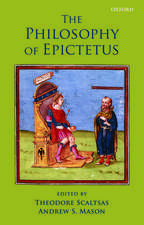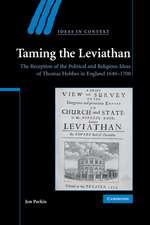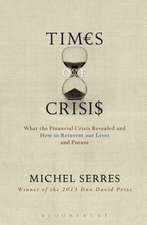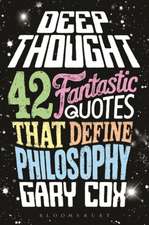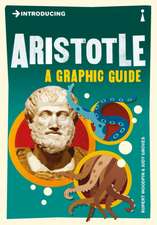Modern Challenges to Past Philosophy: Arguments and Responses
Autor Professor Thomas D. Sullivan, Professor Russell Pannieren Limba Engleză Paperback – 23 apr 2014
| Toate formatele și edițiile | Preț | Express |
|---|---|---|
| Paperback (1) | 165.03 lei 43-57 zile | |
| Bloomsbury Publishing – 23 apr 2014 | 165.03 lei 43-57 zile | |
| Hardback (1) | 566.78 lei 43-57 zile | |
| Bloomsbury Publishing – 23 apr 2014 | 566.78 lei 43-57 zile |
Preț: 165.03 lei
Preț vechi: 191.91 lei
-14% Nou
Puncte Express: 248
Preț estimativ în valută:
31.58€ • 32.90$ • 26.26£
31.58€ • 32.90$ • 26.26£
Carte tipărită la comandă
Livrare economică 10-24 februarie 25
Preluare comenzi: 021 569.72.76
Specificații
ISBN-13: 9781441170637
ISBN-10: 1441170634
Pagini: 216
Dimensiuni: 140 x 216 x 18 mm
Greutate: 0.3 kg
Editura: Bloomsbury Publishing
Colecția Bloomsbury Academic
Locul publicării:New York, United States
ISBN-10: 1441170634
Pagini: 216
Dimensiuni: 140 x 216 x 18 mm
Greutate: 0.3 kg
Editura: Bloomsbury Publishing
Colecția Bloomsbury Academic
Locul publicării:New York, United States
Caracteristici
Understanding
of
how
past
philosophy
illuminates
problems
such
as
the
self
and
the
soul
Notă biografică
Thomas
Sullivanis
Professor
of
Philosophy
Emeritus,
and
before
his
recent
retirement
held
the
Aquinas
Chair
in
Philosophy
and
Theology,
at
the
University
of
St.
Thomas,
St.
Paul,
USA.
He
is
the
co-author,
with
Sandra
Menssen,
ofThe
Agnostic
Inquirer:
Revelation
from
a
Philosophical
Standpoint(2007).Russell
Pannieris
Emeritus
Professor
of
Law
at
William
Mitchell
College
of
Law,
St.
Paul,
USA.
He
has
published
in
the
areas
of
philosophy
of
logic,
metaphysics,
jurisprudence,
ethics,
constitutional
law,
philosophy
of
religion,
and
decision
theory.
He
has
published
several
essays
on
some
of
those
topics
with
Thomas
D.
Sullivan.
Cuprins
AcknowledgmentsChapter
1.
Problems
and
PerspectivesChapter
2.
The
Essence
of
PhilosophyChapter
3.
Arguments
for
Taking
Past
Philosophers
SeriouslyChapter
4.
Science,
Scientism,
and
PhilosophyChapter
5.
Scientistic
Attacks
on
Past
and
Present
PhilosophyChapter
6.
Philosophic
Attacks
on
Past
and
Present
PhilosophyChapter
7.
Philosophy,
Time,
and
EternityBibliographyIndex
Recenzii
In
their
characteristically
clear
style,
Sullivan
and
Pannier
give
an
account
of
the
nature
of
philosophy,
and
then
they
give
a
series
of
detailed
arguments
for
the
conclusion
that
philosophy
is
best
carried
out
in
dialogue
not
only
with
philosophers
contemporary
to
us,
but
also
with
the
philosophers
of
the
past.
Those
who
care
about
doing
philosophy,
or
who
care
about
teaching
it,
should
care
about
this
book.
No serious person thinks the the latest art or literature is the best because it is the most recent. Likewise we would not continue to read Plato, Aristotle, Aquinas and Kant unless their works continue to speak to us. But how can long-dead thinkers have anything to say to 21st century minds? Thomas Sullivan and Russell Pannier engage that question and in doing so illuminate the nature of philosophy, the perennial character of its questions and the need to bring past and present together in ways that illuminate each. Elegantly crafted their book is a pleasure and a provocation.
Sullivan and Panier argue convincingly that philosophers of the past are our partners. The gems of the philosophical past are not just historical relics, but can help us in our own search for answers to philosophical questions. This book will make you want to read more history!
Some philosophers (e.g., Kant, Wittgenstein) defend various philosophical positions, but argue that past philosophy is largely irrelevant to what they are doing. This book looks at a number of these positions and makes the case against the deniers that much of past philosophy is, after all, relevant to these discussions [.] It could be background reading for any course, such as one on Wittgenstein, wherein the subject has arrogantly dismissed philosophy's past.Summing Up:Recommended. Upper-level undergraduates and graduate students.
No serious person thinks the the latest art or literature is the best because it is the most recent. Likewise we would not continue to read Plato, Aristotle, Aquinas and Kant unless their works continue to speak to us. But how can long-dead thinkers have anything to say to 21st century minds? Thomas Sullivan and Russell Pannier engage that question and in doing so illuminate the nature of philosophy, the perennial character of its questions and the need to bring past and present together in ways that illuminate each. Elegantly crafted their book is a pleasure and a provocation.
Sullivan and Panier argue convincingly that philosophers of the past are our partners. The gems of the philosophical past are not just historical relics, but can help us in our own search for answers to philosophical questions. This book will make you want to read more history!
Some philosophers (e.g., Kant, Wittgenstein) defend various philosophical positions, but argue that past philosophy is largely irrelevant to what they are doing. This book looks at a number of these positions and makes the case against the deniers that much of past philosophy is, after all, relevant to these discussions [.] It could be background reading for any course, such as one on Wittgenstein, wherein the subject has arrogantly dismissed philosophy's past.Summing Up:Recommended. Upper-level undergraduates and graduate students.



